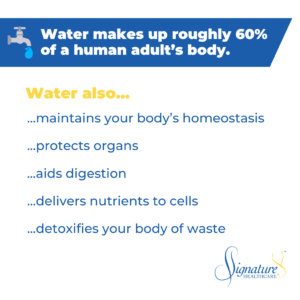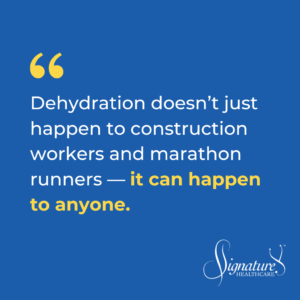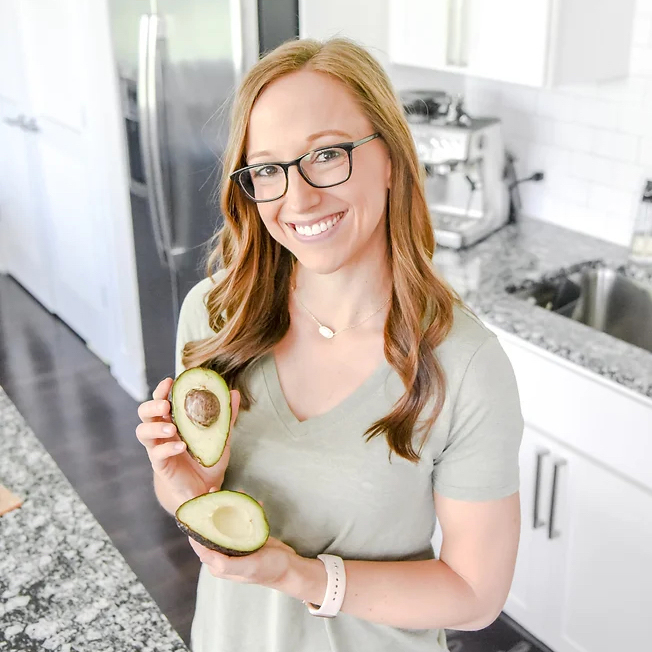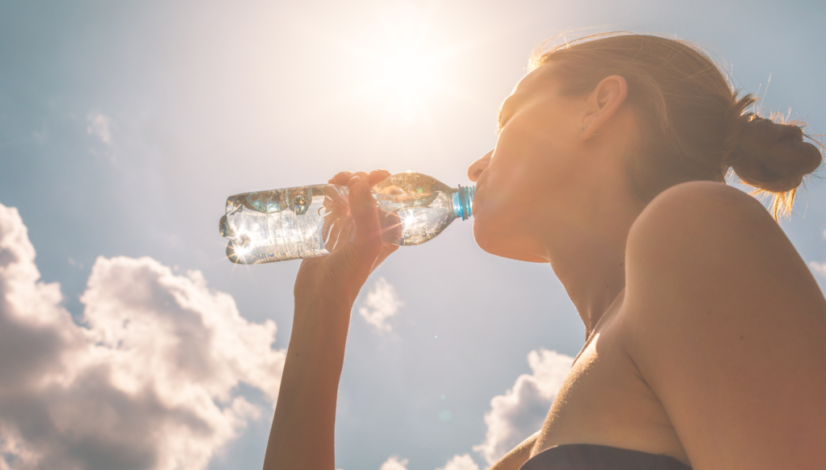Is There Really a Best Way to Hydrate?
On a hot summer afternoon, have you ever felt a sudden headache while gardening or dizziness while hiking? You may have been dehydrated.
When you don’t drink enough fluids to cope with strenuous activity or overly warm conditions, you can experience headaches, fatigue, faintness, weakness, and/or dry mouth. By the time you experience those symptoms, you’re likely already dehydrated.
How do you know if or when you’re well-hydrated? And is there a “best way to hydrate” to prevent dehydration before it starts?

Water and Your Body
Water makes up roughly 60% of a human adult’s body. It maintains your body’s homeostasis, protects organs, aids digestion, delivers nutrients to cells, and detoxifies your body of waste.
Certain populations with a higher risk of dehydration should take extra care to get a steady supply of healthy fluids:
- Seniors’ bodies have a lower percentage of water, meaning they may not experience thirst, even when dehydrated. Some may not be mobile enough to access fluids regularly.
- Infants’ bodies are composed of 70% water or more and can be especially susceptible to electrolyte disturbances from dehydration.
- For people with diabetes or chronic kidney disease, the kidneys work overtime to flush out urine, which can cause dehydration.
- Pregnant women have increased fluid needs to support the formation of amniotic fluid and a higher blood volume.
- People who work outside, especially in extreme heat, lose excessive fluid.
- Professional athletes can be prone to dehydration when they sweat excessively during intense exercise.
But dehydration doesn’t just happen to construction workers and marathon runners — it can happen to anyone.

The Best Way to Hydrate Quickly
So, if you feel the symptoms, is there a best way to hydrate?
It’s important, of course, to increase fluid intake quickly when dehydration sets in. Here’s what to drink if you need to hydrate fast:
- Plain water: It may not be the most exciting option, but plain, pure water is the best hydrator of all. Grab any form of water you can drink enough of (the fewer additives, the better).
- Seltzers or flavored water: These choices contain carbonation, which might be more appealing to some and thus increase fluid intake.
- Electrolyte replacement drinks: If you lose fluids due to illness (like a stomach bug) or intense sweating (due to a strenuous workout or high temperature), rehydrate with an electrolyte replacement to maintain fluid balance and muscle function. Be careful with electrolyte packets — they’ll restore optimal function but may contain excess sodium, which can affect conditions such as hypertension.
- Unsweetened coconut water or unsweetened hot tea: These effective natural options deliver some flavor, and coconut water has a substantial amount of restorative potassium (and less sodium than the typical electrolyte packet).
How to Stay Hydrated
Your body continually loses fluids throughout your busy day, even while you sleep. Here’s how to stay well-hydrated:
- Most of us are a bit dehydrated when we wake up in the morning. Start your day with a refreshing glass of water before having anything else.
- It seems basic, but… pay attention to your body’s signals. Feel thirsty? Have some water!
- There’s no set formula for how much water to drink each day — it simply depends on the individual. A good idea is to monitor the color of your urine: Anything darker than a pale yellow color can mean you’re dehydrated. (However, certain supplements such as B vitamins may produce neon yellow-colored urine, even if you’re adequately hydrated. Consider your individual circumstance.)
- Pair a glass of water with every caffeinated or alcoholic drink you consume. Alcohol and caffeine are diuretics — they make the body excrete excess fluid, which can be dehydrating if not accounted for. A glass of water with your alcoholic beverage is an ideal way to balance your hydration (but this only works if you drink alcohol in moderation).
Final Thoughts on the Best Way to Hydrate
So, is there really a best way to hydrate? That depends on you.
We’re happy to consult with you personally to get to know your lifestyle and help bring more and better hydration to your day. We look forward to the chat!

Natalie Mokari, RDN LDN
Natalie Mokari is a skilled dietitian with a Bachelor of Science in Food Science and Human Nutrition from Clemson University, complemented by a dietetic internship in Charlotte. Her expertise spans outpatient clinical nutrition, private counseling, corporate wellness, and school food service, emphasizing a non-diet approach and mindful eating. Outside the clinic, she relishes trying new recipes, outdoor activities, traveling, and exploring Charlotte with her husband and dog.

